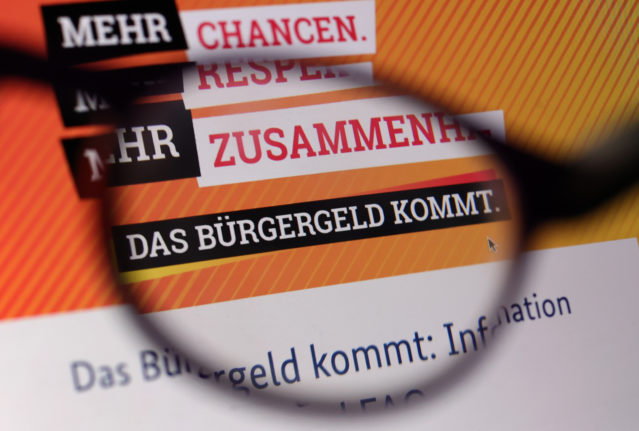Make sure your ad blockers are turned off to see all the content in this story.
We all love Germany's public holidays (gesetzliche Feiertage), whether it's Tag der Arbeit (Labour Day), Christi Himmelfahrt (Ascension Day) or Erster und Zweiter Weihnachtstag (Christmas Day and Boxing Day).
But one major difference I noticed about living in Germany compared to my home country of Scotland, is that when a public holiday falls on Saturday or Sunday it is not transferred to a week day.
This weekend we can see this in action: October 3rd is Tag der Deutschen Einheit or German Unity Day. It's a huge event marking the date when East and West Germany came together to form the modern-day Bundesrepublik.
Unlike some other holidays that are regionally celebrated (for example only Berlin has Frauentag or Women's Day), German Unity Day is a nationwide public holiday, meaning shops and offices are closed.
But this year since it's on a Saturday, most people don't actually get the holiday… because it's on the weekend anyway.
In my opinion, days off for public holidays should be given on weekdays so that the majority of workers can benefit. That's surely the point in them. I don't think it's really fair that in 2019 I had more days off than in 2020. It should remain consistent.
Of course people who work in shops will get the day off on Saturday because everything will be closed. But to make up for being shut on Saturday, many retailers in Germany are opening on Sunday October 4th (when usually they would be shut). So it doesn't really equal a public holiday for the likes of supermarket employees and other retail workers.
READ ALSO: What and when are Germany's 2020 public holidays?
Understandably, emergency workers and those in some other sectors do not get public holidays off but they should get them included in their annual leave so they benefit from the holiday another time.
I tweeted my thoughts on this earlier this week and lots of people had strong opinions. So at The Local Germany we did a poll. Here are the results:
QUICK POLL: Unlike some other countries, Germany does not transfer public holidays that fall on the weekend to a weekday. Should this change? (Germany Unity Day is this Saturday October, 3rd)
— The Local Germany (@TheLocalGermany) October 1, 2020
So the vast majority – more than 70 percent – of people who took part in our online poll said Germany should change this system and move public holidays to weekdays to avoid 'losing' days off. Around 26 percent said things should remain the same.
'The day off should be transferred to Monday'
Lots of people shared my opinion on changing the system for a variety of reasons:
This is a real big bug bearer of mine too that public holidays which fall on weekends are not moved to the following week. No extra day off.
If Christmas and Boxing day fell on the weekend in the UK, you'd get Monday/Tuesday off. https://t.co/6B6nz3x4S0
— ℭ????? ????? ? (@Shellybellylou) September 30, 2020
it should be like in the US where there is no fixed date, rather always on Monday or Friday. Except maybe 4th July but that falls almost always near the weekend
— @snacktaku (@snacktaku) September 30, 2020
? Yep, this was very confusing for me moving to Berlin.
Talking with German colleagues though, and they couldn’t understand the problem. “It was on the weekend, you had the day off.” ?♂️
— CluelessDad (@ProfessorFunky) September 30, 2020
Amen. Already seeing Xmas next year and not a single day off ? https://t.co/P5a8ebqJdb
— Allan Howe (@allan_howe) September 30, 2020
Meanwhile, independent shops have pointed they lose an important day of trade if the shop has to be closed on Saturday.
It's annoying, I agree. The day off should be transferred to the Monday. Saturday is naturally our busiest day of the week, so we experience a significant loss of income when public holidays fall on Saturdays.
— Curious Fox Books (@BerlinBooks) September 30, 2020
Some people, however, believe the system is fine.
TBH as a German I do not mind it.
I appreciate, though, that all elections take place on Sundays so only a small percentage of people are kept from voting because they have to work. At least we have this sorted out.?— Cleo Helluy (@Lachssashimi) September 30, 2020
And for freelancers it's not so bad.
As a freelancer, I'm delighted. May kills me financially with all the holidays?
— David P. (@southlondonscum) September 29, 2020
Newspaper Berliner Zeitung joked about how long the queues are at the few shops open on public holidays.
Some people pointed out that Germany has a generous number of public holidays (compared to the UK and some other countries).
At least International Women's Day is on a Monday in 2021! And you still have 4 more public holidays in Berlin than you'd have in the U.K. – if that helps…
— StefanieBolzen (@StefanieBolzen) September 29, 2020
More 'lost' holidays
Some people noted that residents in some parts of Germany also “lose out” on Reformationstag (Reformation Day) on October 31st this year because it falls on a Saturday (it's celebrated in nine states). And Allerheiligen (All Saints Day) on November 1st which falls on Sunday (it's celebrated in five states).
We also miss out on November 1st this year 🙁
— Mr Celtic ?????️? (@Celticanz) October 1, 2020
Plus the second Christmas Day or Boxing Day on December 26th falls on a Saturday this year so that one is out the window too.
And let's not get started on next year and the one after…
2021 looks grim – 3rd Oct, 25/26 Dec and New Year 22 are at the weekend.
— Colin MacLean (@colmaclean) September 30, 2020
Meanwhile, the Berliner Zeitung pointed out that for those of us who haven't stocked up on food before the shops shut on Saturday, we could queue for a very long time at the few shops that remain open on holidays… and maybe we'll meet the love of our life.
This is German Tinder. Many a happy marriage started in line on a holiday afternoon at the Ostbahnhof Rewe.
— Berliner Zeitung English Edition (@ber_zeitung_en) September 30, 2020
What's the solution?
Of course employers can choose to give their employees a day off when a public holiday falls on the weekend, for example it could be transferred to the nearest Monday. This would be especially welcome at times like the festive period when respite from work is especially appreciated.
But as workers we can't rely on all employers doing that, or giving public holiday days that don't fall on weekends as part of annual leave.
Perhaps it's because I grew up in a different and country and culture that I feel strongly about it. But I seriously think politicians in Germany should consider changing this system.
Do you agree or do you have a different opinion? We'd be really interested in your thoughts. Let us know by emailing [email protected]




 Please whitelist us to continue reading.
Please whitelist us to continue reading.
Member comments